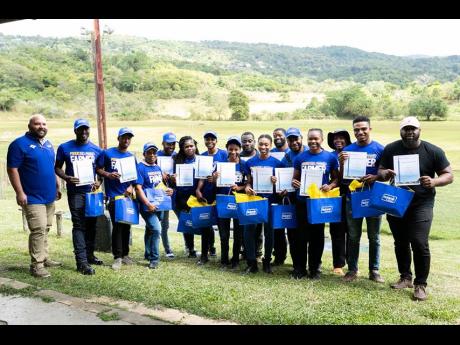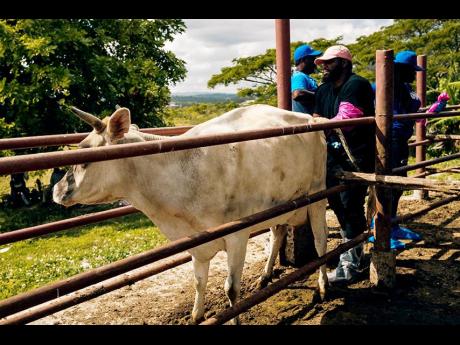Players in livestock sector trained to boost cattle production
More local and regional agricultural professionals have received training and certification in artificial insemination (AI) as a result of a collaboration between Nutramix and Select Sires Incorporation, helping to transform the cattle industry in the Caribbean.
Fifteen workers were able to take part in three days of hands-on training sessions held at the Windalco Sports Club in Kirkvine, Manchester, from January 31 to February 2. These participants included animal health technicians from the Ministry of Agriculture’s Veterinary Services Division, instructors from the College of Agriculture, Science and Education (CASE), AI technicians, and people who work on local farms as technical personnel.
The workshop sensitised participants about the anatomy and physiology of cows, the various AI techniques, heat detection and the timing of insemination.
They were also given the chance to conduct the procedure themselves for a real hands-on experience.
Upon completion, the trainees were certified as artificial insemination technicians in cattle by Select Sires.
The America-based Select Sires Incorporation is the leading supplier of top-quality genetics for cattle. The recent programme was led by Dr Gabrielle Young, senior manager of livestock support at Nutramix and Richard Ellerbrook, Select Sires senior US technical services manager.
AI is the introduction of semen into the female reproductive tract without the use of the male animal.
The usage of “superior sires” (the male parent of an animal) around the world has had a significant impact on and contributed to the development of the local industry and its output quality, according to Young, who spoke with The Gleaner on Friday.
“Nobody is gonna sell you their best animal... but with AI you can collect the semen from the best animal, so you will be getting superior genetics from the best animals in the world,” she explained, adding that there would evidently be an improvement in the gene pool of 20 and 30 times the normal local production.
She added that this also benefits the country with new bloodlines for breeds, and improves animals’ milk yields, their growth rate and the overall productivity of the nation’s herds.
In order to increase the production and productivity of livestock development in Jamaica and the Caribbean, the Food and Agriculture Organization and similar organisations began providing training in AI techniques in 2015.
This is the fourth training and certification session that has been held in Jamaica. Other opportunities to host the workshop were missed due to the onset of the COVID-19 pandemic in 2019.
Godfrey Levy, a lecturer in the department of animal science at the CASE, informed The Gleaner on Friday that he appreciated the interactive nature of the sessions which gave farmers the chance to learn how to incorporate genetics as a way to boost their own production levels and the productivity of the Jamaican agro-processing industry.
“Artificial insemination provides more from less,” said Levy who is also a local farmer.
He praised the efforts made and emphasised the need for more farmers in the sector to undergo similar training so as to help lower the expense of having to hire an AI technician.
The partnership between both companies has, over the years, allowed for similar workshops to be held once a year in person so as to continually train the Nutramix team and local farmers.
Nutramix supplies feed, genetic material, and technical assistance to some 12 different countries in the Caribbean.
“We don’t want to just train people and leave them; we’re trying to build sustainable industries. We’re trying to get that knowledge right across the length and breadth of Jamaica and the Caribbean,” said Nutramix veterinarian Dr Patrick Craig.
Cattle Commodity Supervisor in the Ministry of Agriculture in St Lucia, Stanley Oshaughnessy, commended the efforts and noted that St Lucia aims to become versed in cattle AI to boost its agricultural sector.
“We’re trying to revitalise the cattle industry in St Lucia and get some trained personnel to do artificial insemination because it’s something that is demanded by the cattle farmers on the island”, he explained.
According to the Jamaica Dairy Development Board (JDDB), Jamaica imports some US$86 million worth of beef, goat, and milk products.
A $50 million National Small Ruminant Development Programme was launched by the Ministry of Agriculture in 2021.
Nutramix, through Newport Mills, a division of the CB Group which produces the animal feed brand, invested in supporting import substitution and essentially the creation of conditions that will enable Jamaica to reduce the importation of these products over time.
“A few years ago we achieved 10 million [litres of milk] and we’re trending up to 20 million now, so we want people to be out there breeding more cows and getting more milk on the market. The trainees will be seasoned AI technicians and they too will be able to provide training for people in their area,” Craig argued.


